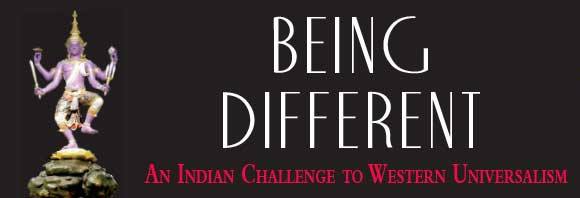Many Indian spiritual leaders, lacking a profound knowledge of their own culture, and feeling inferior to the West, try to respond to the Western challenge by showing how Indian and western religions are the same. They chant “sarva-dharma-sama-bhava” (all religions are equal) out of context, causing much confusion. In the midst of this morass arises the ”lotus of Rajiv” (the word rajiv means a lotus in Sanskrit) in the form of his book, Being Different. Rajiv Malhotra’s work is a kind of yajna that reverses the gaze upon the West through the lens of Indian knowledge systems. This process is traditionally called purva paksha, and in Rajiv’s work it is given a new mission and a new importance.
The book argues that those aspects of India which appears different, strange, problematic and an exotic mishmash to the Western eye are, indeed, the key to an underlying unity. Being Different explains that there is a pristine, all-encompassing, Reality, both immanent and transcendent, that expresses itself as all the varieties, dualities and so-called chaos. There is order in chaos, birth in death, creation in destruction, and simplicity in complexity.
Rajiv Malhotra has devised the very interesting metaphor of digestion to pinpoint the destructive effect of what is usually masqueraded as the assimilation, globalization, melting pot, or postmodern deconstruction of difference. The dharmic traditions have been a target for digestion into the belly of Western culture. Being Different challenges the legitimacy of such attempts with profound logic and examples. Its analysis of Abrahamic religions shows how they are history-centric. This fixation drives them into claims of exclusiveness and gives them anxiety over cultural differences which they seek to resolve through appropriation, assimilation, conversion – all forms of digestion that obliterate whatever seems challenging. The dharmic traditions are not driven by the same anxieties because of their vision of the integral unity of all existence.
Interestingly, the author has followed the traditional purva paksha style, a distinctive feature of exegesis in Sanskrit. The purva paksha accounts of past debates are no longer relevant in a practical sense, and new purva pakshas are needed for this era. Being Different breaks new ground in that direction. The result is a highly original and sincere attempt to compare the basic paradigms of Indian and Western thought. This book will open the eyes of any fair-minded reader regardless of worldview.


